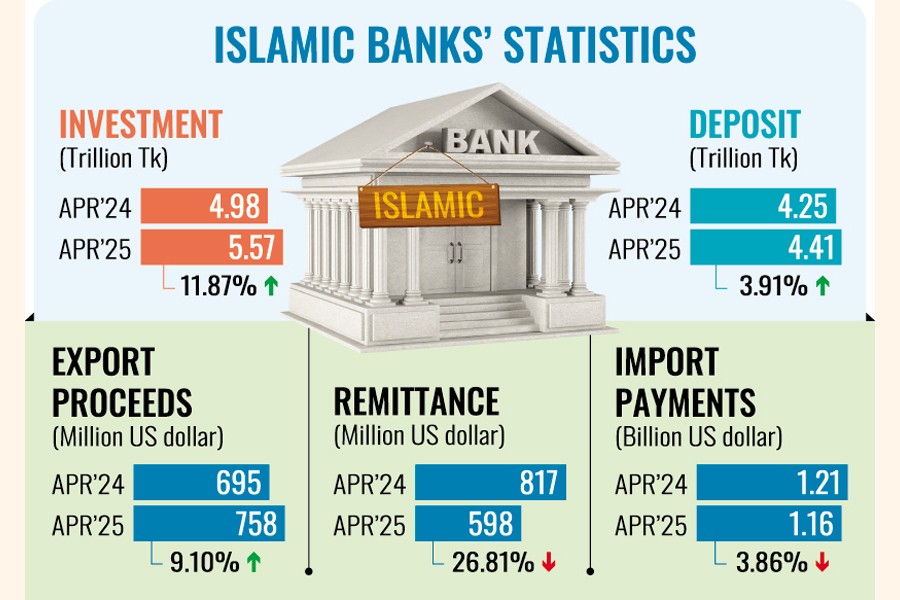
Published :
Updated :

The country's Islamic banking sector saw a robust year-on-year growth in investments despite a slowdown in deposit growth between April 2024 and April 2025.
While total investments in the sector jumped 11.87 per cent, deposits grew at a modest 3.91 per cent, according to the Bangladesh Bank (BB) data.
Deposits in Islamic banks rose from Tk 4.25 trillion in April 2024 to Tk 4.41 trillion in April 2025.
By contrast, conventional banks recorded a stronger deposit growth of 11.10 per cent over the same period, increasing from Tk 13.70 trillion to Tk 15.22 trillion.
This disparity contributed to a decline in Islamic banks' market share of deposits, which fell from 23.66 per cent in April 2024 to 22.47 per cent in April 2025.
The country's banking sector experienced an upward trend in the growth of deposits from November 2023 to April 2025.
The total banking system deposits increased from Tk 17.94 trillion in April 2024 to Tk 19.63 trillion in April 2025, reflecting a growth of nearly 9.40 per cent.
Industry observers link the drop in Islamic banks' market share of deposits to mismanagement issues detected after the July uprising, which eroded depositor confidence and prompted withdrawals.
On the other hand, investments in Islamic banking grew significantly from Tk 4.98 trillion in April 2024 to Tk 5.57 trillion in April 2025, reflecting an 11.87 per cent rise, the central bank data revealed.
The country's banking sector observed considerable growth in investments from November 2023 to April 2025.
Investments rose from Tk 20.03 trillion in April 2024 to Tk 22.30 trillion in April 2025, marking a considerable growth of 11.36 per cent.
The total assets of Islamic banks also surged, increasing by 14.55 per cent from Tk 7.98 trillion to Tk 9.14 trillion during the same period.
Export proceeds handled by Islamic banks remained relatively steady between November 2023 and April 2025 with minimal fluctuations, according to the data.
The highest value was recorded in September 2024 at $837 million.
In a year-on-year comparison, April 2025 saw a 9.1 per cent rise to $758 million, up from $695 million in April 2024.
In April 2025, Islamic banks accounted for around 19 per cent of the total import payments in the economy.
However, their import payments fell by 3.86 per cent year-on-year, from $1.21 billion in April 2024 to $1.16 billion in April 2025.
The sector faced a steep drop in remittance share from about 40 per cent in early 2024 to around 22 per cent by April 2025. In absolute terms, remittance inflows to Islamic banks declined from $817 million in April 2024 to $598 million in April 2025.
Meanwhile, conventional banks saw their remittance inflows rise sharply from $1.23 billion to $ 2.15 billion over the same period.
In the agent banking segment, Islamic banks maintained a significant presence.
Their deposits rose from Tk 204 billion in April 2024 to Tk 230 billion in April 2025, marking a 13.18 per cent growth.
The central bank data revealed that in April 2024, Islamic banks accounted for holding 55.08 per cent of the total agent banking deposits.
The Islamic banking system operates under the Shariah principles, prohibiting interest (Riba) and emphasising risk-sharing between stakeholders.
The industry has grown substantially over the past decade, with conventional banks increasingly opening Islamic banking branches and windows to meet public demand.
Currently, 17 conventional banks operate 35 Islamic branches, while 12 banks provide services through 571 Islamic windows.
Nine banks offer both branch and window services.
The Islamic banking journey began in 1983 with the establishment of Islami Bank Bangladesh.
sajibur@gmail.com


 For all latest news, follow The Financial Express Google News channel.
For all latest news, follow The Financial Express Google News channel.